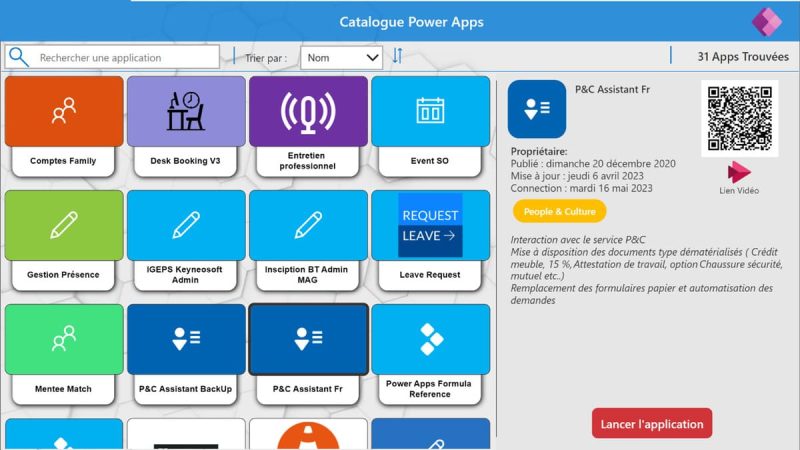Citizen developers - table of contents
What is a citizen developer?
A citizen developer is a person who, without formal training in programming, can create web or mobile applications that fit into a company’s digital environment and are functional. They can create automations and applications that are strictly tailored to their own needs or the needs of others in the company. Usually, these are simple solutions that are created in a short time, often using platforms:
- no-code – where applications are created without writing any code by dragging and dropping pre-built components, such as in Microsoft Power Apps,
- low-code – where solutions require minimal code writing skills, just like in Apps Script or Appian.
Low-code and no-code platforms are a must for citizen developers. They allow them to build applications in days or even hours instead of weeks or months. As a result, ordinary workers can quickly meet their needs and solve problems without having to wait for help from IT.
For example, an HR professional may create a time management application that automates adding meetings to the calendar, streamlining internal processes and saving developers’ time.
What is the relationship between citizen development and implementing AI and automation?
The latest AI tools, such as ChatGPT and GitHub Copilot, open up new possibilities for citizen developers. They allow you to ask a question about a desired functionality in natural language, and the algorithm will generate ready-made code or even an entire application in response to the prompt.
For example, a salesperson might ask ChatGPT to create a mobile app for tracking sales leads. The chatbot will ask a few questions explaining the exact requirements, and then generate the app code and (in the ChatGPT Plus version) also user interface mockups. Such a process will take only an hour or two.
It will be even easier to get a solution that is supposed to be just another automation in a popular low-code tool. There is a high probability that we will get the right code with instructions on how to run our new automation.
Citizen developers can implement AI-based solutions on their own and speed up automation in their companies without involving specialists. However, AI tools cannot yet be expected to generate fully working solutions on the first try.
They are more like skilled collaborators of citizen developers than tools that can replace the work of people who know at least the basics of programming. Often you have to correct solutions repeatedly or suggest to ChatGPT how to solve a problem. This allows you to obtain a finished version of the application much more quickly, but it’s not a one-click task.

Source: DALL·E 3, prompt: Marta M. Kania (https://www.linkedin.com/in/martamatyldakania/)
How can citizen developers help your company?
Here are several key benefits of employing individuals who, in addition to their specialization, also take on the role of citizen developers within the company:
- Accelerating digital transformation. By spreading your application development skills across a broader group of employees, you can increase the speed of delivering innovative solutions by up to 90%. As a result, you can catch up with the competition and bring new products to market at an impressive pace.
- Improving digital employee experience. Citizen developers can build exactly the applications they need for their everyday work. As a result, they are more willing to use them, more engaged, and more productive. They also don’t have to wait for months until the IT department finds the time to implement their ideas or until their supervisor decides to purchase software that will make their work easier.
- Increasing the adoption of new technologies. Employees are more likely to adopt solutions created by their peers who share their mindset and understand the specifics of their work. Thanks to citizen developers, the reach of new technologies is much broader than with the traditional model of delivering off-the-shelf systems by IT.
How to prepare a company for working with citizen developers?
To fully harness the potential of citizen developers, companies need to create appropriate conditions. Here are five key steps:
- Recruitment and training. Many companies already have programming “handymen” who help employees create small automations. Others, however, must recruit willing employees or train the team to use selected tools, such as those for building applications or analyzing data. Some organizations also require certification of skills before a citizen developer can make changes to the organization’s IT systems.
- Tools. It is necessary to provide citizen developers with access to low-code/no-code platforms and repositories of ready-made components and models to facilitate their work. Basic access to tools such as Make or Zapier is free; however, if a citizen developer wants to use more advanced features or manage access, purchasing a subscription will be required.
- Community support. To truly harness the potential of citizen developers, it is worthwhile to provide them with opportunities for growth, such as organizing hackathons, competitions, and meetups, allowing them to share knowledge and enhance their skills.
- Risk and value control. However, having citizen developers in the enterprise is not without its challenges. A critical aspect of the IT developers’ work within the enterprise is ensuring their security. This is important to emphasize because new no-code/low-code developers often have little experience in software security. It is advisable to establish a unified policy for data security, compliance, and the continuity of business systems in your organization. Additionally, it’s important to assess the real impact of the implemented solutions to avoid discovering that they don’t genuinely enhance your team’s efficiency.
- Innovation culture. It is also crucial to build a culture of experimentation, knowledge-sharing, and rewarding innovative ideas among employees in the company. This way, more employees will have the opportunity to “get hooked” on citizen development.
Which companies have benefited the most from citizen developers?
Many companies, both large and small, have already benefited from the opportunities presented by employees independently designing small IT solutions. Here are three companies that have achieved significant success in implementing solutions created by citizen developers.
Accenture
Accenture is a company specializing in business and technology consulting services. They implemented the Microsoft Power Platform to enable employees to quickly create applications and workflows. The primary goal was to accelerate data management within the company. However, the company recognized that citizen development significantly increased organizational productivity and flexibility. As a result, over 8,000 applications were created by citizen developers within six months in the company.
Accenture also fosters a culture of knowledge sharing by organizing presentations of solutions created by citizen developers. In this way, the company aims to help employees develop skills and independently customize technologies.
Toyota
Toyota, a leading automobile manufacturer, has created a center of excellence that trains employees on the Power Platform, but also encourages them to experiment on their own and share their results. The company holds an annual “Automation Summit” where teams present their innovative citizen development projects.
Toyota is encouraging its employees to believe that you don’t need a PhD to come up with valuable solutions. They see citizen development as a chance for practically anyone who’s interested.

Source: Microsoft (https://customers.microsoft.com/en-us/story/763052-toyota-motor-north-america-automotive-power-apps)
IKEA
IKEA takes citizen developers seriously. It has established a Power Community of 4,000 members to help with the adoption of low-code technology. The company also rewards those who automate tasks and implement innovations through citizen development. IKEA recognizes that this approach allows employees to focus on their core activities instead of wasting time on repetitive tasks.

Source: Microsoft (https://customers.microsoft.com/en-us/story/1686198659059020881-ikea-retailers-power-apps-en-france)
Summary
Citizen developers are invaluable assets in helping organizations accelerate their digital transformation. They enable you to innovate faster and create solutions that are perfectly tailored to your organization’s needs – after all, citizen developers create them to make life easier for themselves and their colleagues.
To effectively collaborate with citizen developers, it is essential to provide appropriate training, tools, and governance for this group of employees. If you do this, you will gain a team of superheroes ready to optimize your company.

If you like our content, join our busy bees community on Facebook, Twitter, LinkedIn, Instagram, YouTube, Pinterest, TikTok.
Author: Robert Whitney
JavaScript expert and instructor who coaches IT departments. His main goal is to up-level team productivity by teaching others how to effectively cooperate while coding.
AI in business:
- Threats and opportunities of AI in business (part 1)
- Threats and opportunities of AI in business (part 2)
- AI applications in business - overview
- AI-assisted text chatbots
- Business NLP today and tomorrow
- The role of AI in business decision-making
- Scheduling social media posts. How can AI help?
- Automated social media posts
- New services and products operating with AI
- What are the weaknesses of my business idea? A brainstorming session with ChatGPT
- Using ChatGPT in business
- Synthetic actors. Top 3 AI video generators
- 3 useful AI graphic design tools. Generative AI in business
- 3 awesome AI writers you must try out today
- Exploring the power of AI in music creation
- Navigating new business opportunities with ChatGPT-4
- AI tools for the manager
- 6 awesome ChatGTP plugins that will make your life easier
- 3 grafików AI. Generatywna sztuczna inteligencja dla biznesu
- What is the future of AI according to McKinsey Global Institute?
- Artificial intelligence in business - Introduction
- What is NLP, or natural language processing in business
- Automatic document processing
- Google Translate vs DeepL. 5 applications of machine translation for business
- The operation and business applications of voicebots
- Virtual assistant technology, or how to talk to AI?
- What is Business Intelligence?
- Will artificial intelligence replace business analysts?
- How can artificial intelligence help with BPM?
- AI and social media – what do they say about us?
- Artificial intelligence in content management
- Creative AI of today and tomorrow
- Multimodal AI and its applications in business
- New interactions. How is AI changing the way we operate devices?
- RPA and APIs in a digital company
- The future job market and upcoming professions
- AI in EdTech. 3 examples of companies that used the potential of artificial intelligence
- Artificial intelligence and the environment. 3 AI solutions to help you build a sustainable business
- AI content detectors. Are they worth it?
- ChatGPT vs Bard vs Bing. Which AI chatbot is leading the race?
- Is chatbot AI a competitor to Google search?
- Effective ChatGPT Prompts for HR and Recruitment
- Prompt engineering. What does a prompt engineer do?
- AI Mockup generator. Top 4 tools
- AI and what else? Top technology trends for business in 2024
- AI and business ethics. Why you should invest in ethical solutions
- Meta AI. What should you know about Facebook and Instagram's AI-supported features?
- AI regulation. What do you need to know as an entrepreneur?
- 5 new uses of AI in business
- AI products and projects - how are they different from others?
- AI-assisted process automation. Where to start?
- How do you match an AI solution to a business problem?
- AI as an expert on your team
- AI team vs. division of roles
- How to choose a career field in AI?
- Is it always worth it to add artificial intelligence to the product development process?
- AI in HR: How recruitment automation affects HR and team development
- 6 most interesting AI tools in 2023
- 6 biggest business mishaps caused by AI
- What is the company's AI maturity analysis?
- AI for B2B personalization
- ChatGPT use cases. 18 examples of how to improve your business with ChatGPT in 2024
- Microlearning. A quick way to get new skills
- The most interesting AI implementations in companies in 2024
- What do artificial intelligence specialists do?
- What challenges does the AI project bring?
- Top 8 AI tools for business in 2024
- AI in CRM. What does AI change in CRM tools?
- The UE AI Act. How does Europe regulate the use of artificial intelligence
- Sora. How will realistic videos from OpenAI change business?
- Top 7 AI website builders
- No-code tools and AI innovations
- How much does using AI increase the productivity of your team?
- How to use ChatGTP for market research?
- How to broaden the reach of your AI marketing campaign?
- "We are all developers". How can citizen developers help your company?
- AI in transportation and logistics
- What business pain points can AI fix?
- Artificial intelligence in the media
- AI in banking and finance. Stripe, Monzo, and Grab
- AI in the travel industry
- How AI is fostering the birth of new technologies
- The revolution of AI in social media
- AI in e-commerce. Overview of global leaders
- Top 4 AI image creation tools
- Top 5 AI tools for data analysis
- AI strategy in your company - how to build it?
- Best AI courses – 6 awesome recommendations
- Optimizing social media listening with AI tools
- IoT + AI, or how to reduce energy costs in a company
- AI in logistics. 5 best tools
- GPT Store – an overview of the most interesting GPTs for business
- LLM, GPT, RAG... What do AI acronyms mean?
- AI robots – the future or present of business?
- What is the cost of implementing AI in a company?
- How can AI help in a freelancer’s career?
- Automating work and increasing productivity. A guide to AI for freelancers
- AI for startups – best tools
- Building a website with AI
- OpenAI, Midjourney, Anthropic, Hugging Face. Who is who in the world of AI?
- Eleven Labs and what else? The most promising AI startups
- Synthetic data and its importance for the development of your business
- Top AI search engines. Where to look for AI tools?
- Video AI. The latest AI video generators
- AI for managers. How AI can make your job easier
- What’s new in Google Gemini? Everything you need to know
- AI in Poland. Companies, meetings, and conferences
- AI calendar. How to optimize your time in a company?
- AI and the future of work. How to prepare your business for change?
- AI voice cloning for business. How to create personalized voice messages with AI?
- Fact-checking and AI hallucinations
- AI in recruitment – developing recruitment materials step-by-step
- Midjourney v6. Innovations in AI image generation
- AI in SMEs. How can SMEs compete with giants using AI?
- How is AI changing influencer marketing?
- Is AI really a threat to developers? Devin and Microsoft AutoDev
- AI chatbots for e-commerce. Case studies
- Best AI chatbots for ecommerce. Platforms
- How to stay on top of what's going on in the AI world?
- Taming AI. How to take the first steps to apply AI in your business?
- Perplexity, Bing Copilot, or You.com? Comparing AI search engines
- ReALM. A groundbreaking language model from Apple?
- AI experts in Poland
- Google Genie — a generative AI model that creates fully interactive worlds from images
- Automation or augmentation? Two approaches to AI in a company
- LLMOps, or how to effectively manage language models in an organization
- AI video generation. New horizons in video content production for businesses
- Best AI transcription tools. How to transform long recordings into concise summaries?
- Sentiment analysis with AI. How does it help drive change in business?
- The role of AI in content moderation


















